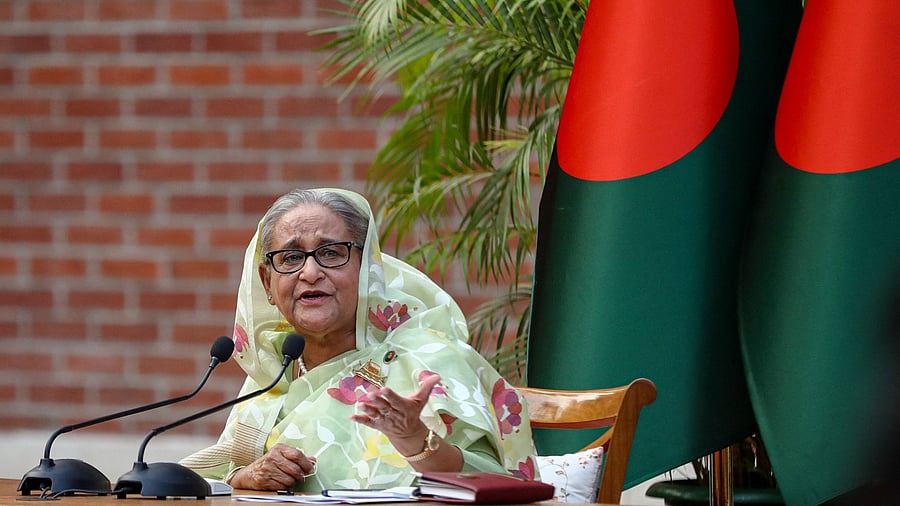
Sheikh Hasina.
Credit: Reuters Photo
New Delhi: Awami League can "never be weeded out" from Bangaldesh's soil, and the party and deposed premier Sheikh Hasina are capable of staging a comeback, veteran journalist and author Manash Ghosh claims, with a caveat that Hasina has to "mend her ways" and change policies to achieve it.
During an interaction held here on the launch of his new book — Mujib's Blunders: The Power and the Plot Behind His Killing — on Monday evening, he also said his idea while writing it was to "not treat him (Mujibur Rahman) as a holy cow."
While the book has been nearly three years in the making, Ghosh, who had a ringside view of Liberation War of 1971 as a reporter of a leading national daily, commenting on the current political landscape of Bangladesh, says, "history seems to be repeating itself." Mass protests in 2024 led to the toppling of the Awami League government in Dhaka and ouster of longtime prime minister Hasina on August 5.
The movement started in July last year under a platform called Students against Discrimination, demanding reforms in a controversial quota system for government jobs, but turned violent, resulting in the fall of the Hasina government. She left the country for India on a military aircraft.
An interim government led by Muhammad Yunus is currently in place in Bangladesh.
Hasina, the 77-year-old Awami League leader, has been facing criticism and a full-frontal attack from the interim government over her past policies as prime minister, and statements issued through social media since she left her country after a dramatic upsurge in protests.
During the interaction, Ghosh was asked can the Awami League, facing a ban, stage a comeback in the future.
"My own perception is, Awami League can never be weeded out from Bangladeshi soil. And, Awami League and Sheikh Hasina have even faced a worse situation and they have staged a comeback. And, I think that time is not very far. Mark my words that time is not very far when people will say that you make a comeback..and take over and be the helmsman of Bangladesh. I think that time is not very far,” he claimed.
If "fair elections" are held today, senior leaders say that Awami League can "sweep the polls" and even those whom she had "treated roughly" contend that she will secure a resounding victory, Ghosh conjectured.
The Yunus-led interim government's Council of Advisers or the Cabinet in May slapped a ban on "all activities of Awami League," including in cyberspace, under an anti-terrorism law.
Also, a special tribunal in Bangladesh on July 10 indicted the deposed premier in absentia on charges of crimes against humanity in connection with a deadly crackdown on protesters during the July-August uprising last year.
The International Crimes Tribunal of Bangladesh (ICT-BD) has set August 3 as the date for the trial.
Despite these developments constraining Hasina and Awami League, Ghosh contended that both can make a return, but he has a rider.
"Hasina has to mend her ways," he asserts.
The whole way of "promoting sycophants, corrupt and pro-Pakistani" things which have served as counter to Indians, "this mindset she has to change," the author said.
Like her father, "history is repeating itself." She is repeating history by keeping them all around her, Ghosh said.
"She has to change her ways and policies. If she continues with the same old policies, she will never secure a comeback. I am 100 per cent sure," he cautioned.
According to Ghosh’s profile shared by the publisher, Niyogi Books, he joined The Statesman in 1966 as a trainee journalist. And, he covered the 1971 Indo-Pak War from various battlefields as an embedded journalist at "considerable risk to his life." When Bangladesh became independent, he was posted in Dhaka (Dacca then) as the newspaper's bureau head for a few years, which allowed him to see the early phase of the first government after the war.
In his new book, he terms it as a sequel to his previous work, "Bangladesh War : Report from Ground Zero" released in 2021.
Ghosh said Bangladesh’s first president, Mujibur Rahman, fought for the liberation of Bangladesh, but he was “not a holy cow”, and had many frailties, which he had tried to highlight.
"He failed miserably and also succeeded like a people’s leader, I have portrayed that," he said, adding, Rahman was like other human beings, with strengths and frailties.
The legacy of Rahman, as he was popularly known, lives on in the names of streets, institutions, public landmarks, his fiery speeches made during the struggle for independence, and the face of the Bangladeshi currency. It also remained visible in statues and murals, which were defaced by protesters last year.
"I didn’t want to paint Mujib as a... he was great leader, mass leader, no two ways about it. But, I wanted to show his character frailties, which I have taken great pains in showing them," Ghosh said.
"...Mujib could do no wrong -- I wanted to debunk that," he said.